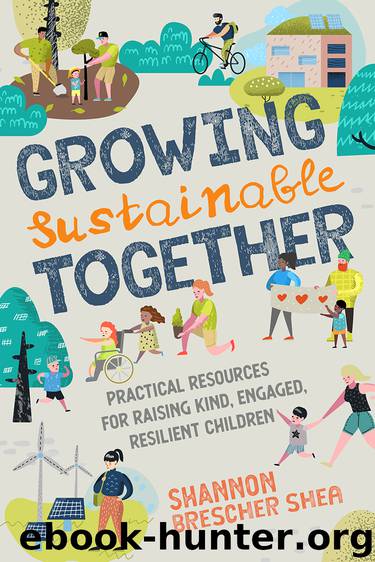Growing Sustainable Together by Shannon Brescher Shea

Author:Shannon Brescher Shea [Brescher Shea, Shannon]
Language: eng
Format: epub
ISBN: 9781623174729
Publisher: North Atlantic Books
Published: 2020-04-14T00:00:00+00:00
Fostering Emotional Well-Being
Perhaps not surprisingly, people who are materialistic are simply less happy than those who are grateful. Even though it sometimes feels like having more stuff will make us happier, it does the opposite in reality. Both an excess of physical stuff and the desire for it can create stress and frustration. In the UCLA study of families in Los Angeles, parents who felt stressed about clutter had higher levels of the chemical cortisol in their blood. Cortisol is associated with depression. The researchers found a direct link between having a high number of objects in the household and physical health.
Burger’s family moved to their tiny trailer for the sake of her son’s mental health and well-being. Her son has severe attention deficit hyperactivity disorder as well as a sensory processing disorder. Moving out of their large farmhouse into a simpler, less overwhelming space reduced his stimulation. With fewer choices and less to manage, he’s far less overwhelmed. “He’s able to think through things a lot better. He’s able to have better impulse control,” she said. “That has been a huge help for us.” When they visit relatives who have a large number of toys, he finds it overly stimulating and needs to decompress for a few days afterward. The “busyness” of the surrounding atmosphere is more stressful than their simpler lifestyle.
Even for children without disabilities, having too much stuff can limit emotional development. According to Payne, having relatively few toys helps children learn the various stages of play: solitary play by themselves, parallel play next to other children, sociodramatic pretend play, and game play. Moving through these different stages helps children build essential social and emotional skills. “If they don’t develop . . . a full range of social and emotional skills, they don’t succeed in life,” said Payne. “The jury is in on that one.”
Being involved in consumer culture—the active desire to buy things—further reinforces this stress. Children who are more materialistic are more at risk for anxiety and depression, as well as less likely to feel connected to others. They’re also more likely to engage in risky activities. A survey led by a researcher from Hofstra University of more than 1,000 high school students in Long Island found that the teenagers who were more materialistic were more likely to be envious of others. In contrast, students who were more grateful were more likely to be satisfied with life, more connected to others, and less likely to be depressed. Similar studies of teenagers have found a relationship between valuing financial success and lower levels of energy, trust in others, feeling like they could be themselves, and likelihood to contribute to society.
Between the combination of materialism, overscheduling, and social pressure, children from affluent, well-educated families are now considered at high risk for mental and emotional health issues. In a 1999 survey by researchers at Columbia and Yale universities, about one-fifth of adolescent girls from suburban upper-middle-class and middle-class families scored as clinically depressed. This was much higher than
Download
This site does not store any files on its server. We only index and link to content provided by other sites. Please contact the content providers to delete copyright contents if any and email us, we'll remove relevant links or contents immediately.
Compact Houses by Gerald Rowan(2104)
Food Storage for Self-Sufficiency and Survival by Angela Paskett(2026)
Backyard Chickens Beyond the Basics by Pam Freeman(1941)
Lagom by Niki Brantmark(1721)
100 Skills You'll Need for the End of the World (as We Know It) by Ana Maria Spagna(1703)
The Unsettlers by Mark Sundeen(1687)
The Magickal Family by Monica Crosson(1670)
Pure Charcuterie: The Craft & Poetry of Curing Meat at Home by Meredith Leigh(1651)
Living Off the Grid by David Black(1622)
Mother Earth News Almanac by Mother Earth News(1544)
A Life Less Throwaway by Tara Button(1484)
The Backyard Homestead Guide to Raising Farm Animals: Choose the Best Breeds for Small-Space Farming, Produce Your Own Grass-Fed Meat, Gather Fresh ... Rabbits, Goats, Sheep, Pigs, Cattle, & Bees by Gail Damerow(1468)
Backyard Foraging by Ellen Zachos(1399)
The Backyard Homestead Seasonal Planner by Ann Larkin Hansen(1387)
The Sustainable Asian House by Paul McGillick(1384)
Fruit Trees, Berries & Nuts by Kim Pezza(1374)
Building Today's Green Home: Practical, Cost-Effective and Eco-Responsible Homebuilding (Popular Woodworking) by Smith Art(1289)
Life Without Plastic by Chantal Plamondon & Jay Sinha(1275)
Making Transparent Soap by Catherine Failor(1266)
